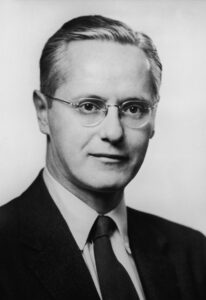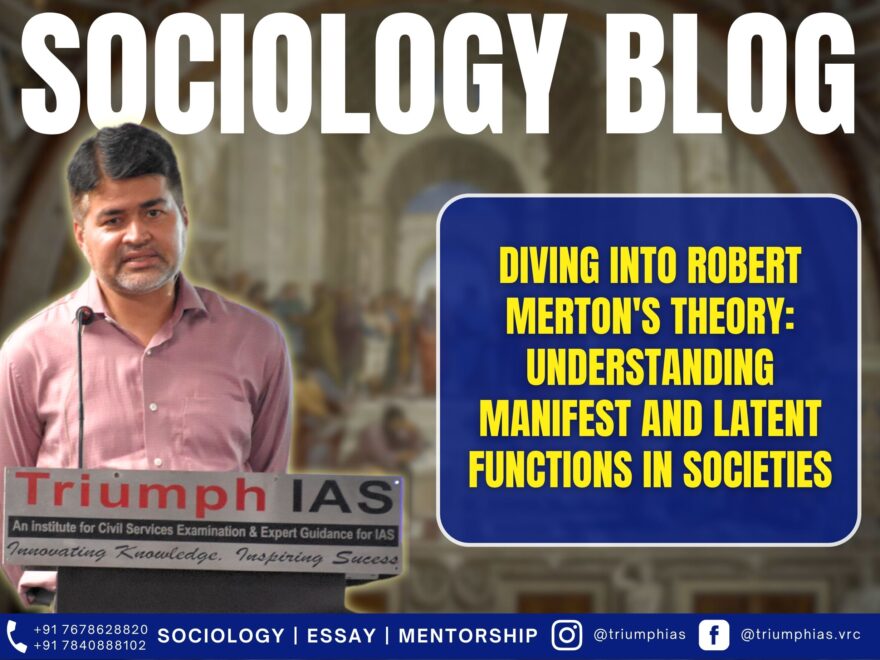
A cardinal American virtue,
‘ambition,’ promotes
a cardinal American
vice, ‘deviant behavior.
Latent and Manifest Functions
Relevant for Sociology Paper-1 (Unit-4)
As per Robert Merton’s perspective, manifest functions refer to those that are purposeful and acknowledged. These functions are the ones that individuals anticipate and expect institutions to fulfill. For instance, schools are commonly perceived as institutions responsible for imparting knowledge and skills to children. Manifest functions are readily apparent, acknowledged, and generally praised.

On the other hand, latent functions are unacknowledged and unintended. These functions are the unforeseen outcomes that arise from institutions. For example, in addition to educating the youth, schools may inadvertently serve as a source of mass entertainment. The latent functions of an institution or a specific structure can complement the manifest functions. For instance, religious institutions in modern society may provide recreational activities and opportunities for courtship to young individuals. Latent functions may also be unrelated to the manifest functions. For instance, elaborate events organized by schools may have no impact on the primary purpose of education.
In some cases, latent functions can even undermine the manifest functions. For instance, while the manifest function of civil service regulations is to ensure a competent and dedicated staff of civil servants to enhance governmental efficiency, the civil service system may inadvertently contribute to the establishment of a more rigid bureaucracy.
It is important to note that the distinction between manifest and latent functions is not absolute but rather relative. A function may appear manifest to some individuals within the social system while being latent to others.
For Merton, the difference between Manifest and Latent function is so important that it reveals so many hidden elements in the system. Merton has presented the difference in the following way:
Functional activities become rational: To illustrate this, Merton provides an example of the rain ceremony practiced by the Hopi Indians in America. During this ceremony, individuals gather and sprinkle water on the ground in the hopes of prompting rainfall. At first glance, this may seem like an irrational act. However, Merton highlights another perspective where the act of coming together enhances group identity, unity, and solidarity. This analysis reveals that an activity initially considered irrational can hold rational and meaningful implications.
Enhances social knowledge: Veblen’s theory of the leisure class can shed light on this aspect. Veblen discusses how people engage in conspicuous consumption, purchasing commodities to display a comfortable lifestyle. Within a single household, the presence of numerous such commodities serves as a conspicuous display of wealth and status in society. However, such practices contribute to inflation rates, which can be detrimental to the country’s economy. Sociologists can offer valuable insights on these phenomena that can be utilized by the government. For instance, the Singapore government has implemented excellent transportation facilities, but if someone decides to buy a car, they would have to pay a significantly higher price.
Opens new avenues for research: Sociologists explore the hidden consequences of manifest functions, providing new avenues for research. This not only benefits the sociologists themselves but also others who can utilize these findings for functional and effective societal development in the future.
Reveals institutional flaws through illegal activities: Merton explains this using the example of the American political system. While America is a democratic country that offers equal opportunities, there are individuals who are deprived of such opportunities and experience a lower quality of life. On the other hand, Merton identifies a group known as the political machine, which engages in illegal activities such as theft and smuggling. The accumulated wealth is then distributed within the group to fulfill the basic needs of those individuals. In this way, people become capable of accessing opportunities.
Merton suggests that where American democracy falls short, the political machine fills the gaps. The real consequence of such activities is that democratic governments should learn from them and work towards the development of underprivileged individuals. This would be highly beneficial for society.
Limination of Merton’s theory of functionalism :
- Absence of rationality: Merton does not address the issue of what is considered functional or dysfunctional, particularly in the context of a modern society. This is a complex question that remains unresolved in Merton’s theory. Furthermore, the relevance of objective consequences is also uncertain since it is difficult to determine rationally to what extent an activity is functional or dysfunctional.
Lack of objectivity and universality: Similar to Brown and Malinowski, Merton relies on examples from simple societies such as the Hopi Indians. This raises doubts about the universality of his theory since it is based on specific cultural contexts. Additionally, Merton himself includes an example of a group, the political machine, to which he has personal connections. This subjectivity compromises the objectivity of his studies. Moreover, the acceptance of the political machine’s illegal actions may not be applicable or approved in all societies, further questioning the universality of Merton’s theory.
To master these intricacies and fare well in the Sociology Optional Syllabus, aspiring sociologists might benefit from guidance by the Best Sociology Optional Teacher and participation in the Best Sociology Optional Coaching. These avenues provide comprehensive assistance, ensuring a solid understanding of sociology’s diverse methodologies and techniques. Sociology, Social theory, Best Sociology Optional Teacher, Best Sociology Optional Coaching, Sociology Optional Syllabus.
Robert Merton, Manifest Functions, Latent Functions, Sociological Theory, Functionalism, Social System, Cultural Context, Institutional Flaws, Societal Development, Rationality, Universality
Follow us :


https://t.me/VikashRanjanSociology
Find More Blogs
|
Scope of the subject and comparison with other social sciences |
|||
|
|
|
|
Modernity and social changes in Europe |


One comment